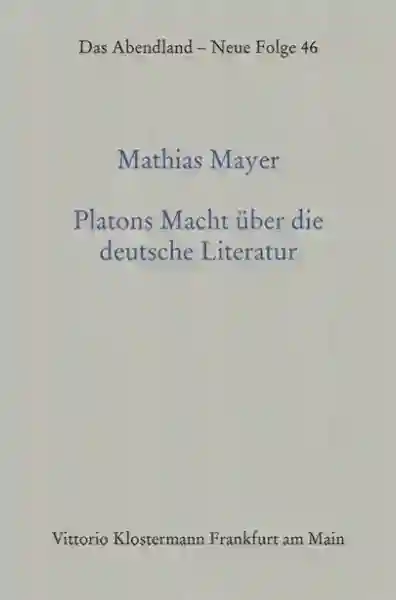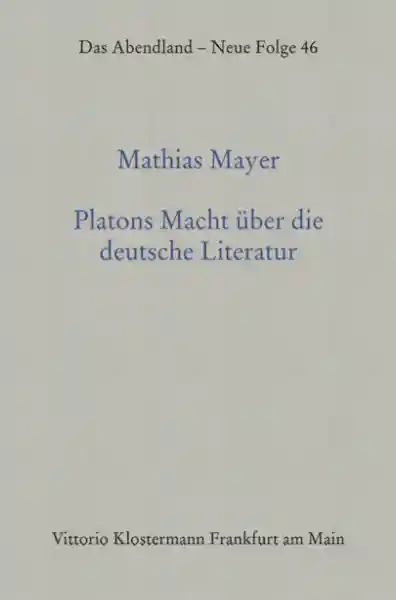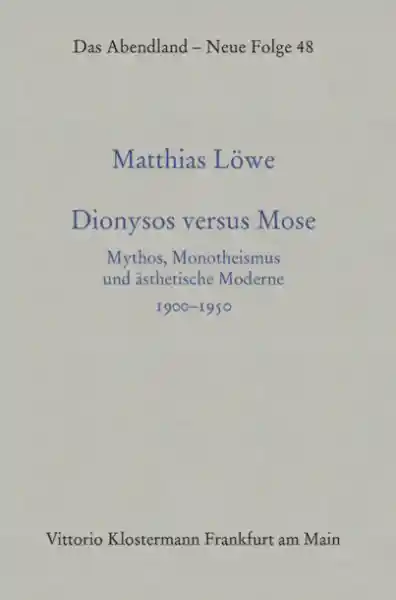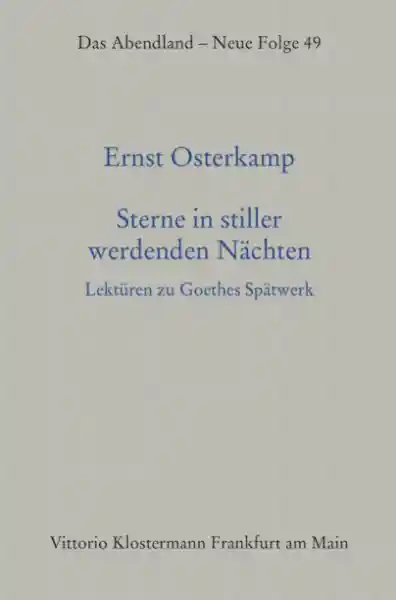Das Abendland. Forschungen zur Geschichte europäischen Geisteslebens
Sterne in stiller werdenden Nächten
Chronologie aller Bände (1 - 3)

Die Reihenfolge beginnt mit dem Buch "Platons Macht über die deutsche Literatur". Wer alle Bücher der Reihe nach lesen möchte, sollte mit diesem Band von Mathias Mayer beginnen. Die Reihe umfasst derzeit 3 Bände. Der neueste Band trägt den Titel "Sterne in stiller werdenden Nächten".
- Anzahl der Bewertungen für die gesamte Reihe: 0
- Ø Bewertung der Reihe: 0
Diese Reihenfolge enthält 3 unterschiedliche Autoren.
- Band: 46
- Autor: Mayer, Mathias
- Anzahl Bewertungen: 0
- Ø Bewertung:
- Medium: Buch
- Veröffentlicht: 11.05.2022
- Genre: Roman
Platons Macht über die deutsche Literatur
Die Dialoge Platons sind Schauplätze listiger Erzählstrategien und dramaturgischer Szenarien. Die Kritik an den Dichtern geht mit einem erstaunlichen literarischen Raffinement einher, über dessen Relevanz freilich viele Diskussionen geführt wurden. Vor allem die Schriftsteller haben die Komplexität seiner Verfahrensweise kreativ aufgegriffen und fortgeführt. Die Impulse des 18. Jahrhunderts und der Romantik sind in der klassischen Moderne ausdifferenziert worden. Im Rückgriff u.a. auf Sören Kierkegaard und Rudolf Kassner zeigt sich bei Hugo von Hofmannsthal und Thomas Mann, bei Bertolt Brecht und Friedrich Dürrenmatt, besonders bei Franz Kafka und Ingeborg Bachmann, wie sehr Platon in der Sicht der Literatur als Autor der Moderne gelesen worden ist.
"Konzise und lesenswerte Studie [...]. Wer sich für die Berührung der Literatur mit der Philosophie interessiert, wird den Band mit Interesse und Gewinn in die Hand nehmen." Informationsmittel für Bibliotheken
Plato's dialogues are scenes of cunning narrative strategies and dramaturgical scenarios. His criticism of the poets goes hand in hand with an astonishing literary refinement, the relevance of which, admittedly, has frequently been subject to discussion. Writers, in particular, have creatively taken up and carried forward the complexities of its procedure. The impulses of the 18th century and Romanticism have been differentiated in classical modernism. Taking recourse to Sören Kierkegaard and Rudolf Kassner, among others, eminent authors such as Hugo von Hofmannsthal and Thomas Mann, Bertolt Brecht and Friedrich Dürrenmatt, and especially Franz Kafka and Ingeborg Bachmann, provide ample evidence of the extent to which writers of literature have read Plato as an author of modernity.
"Konzise und lesenswerte Studie [...]. Wer sich für die Berührung der Literatur mit der Philosophie interessiert, wird den Band mit Interesse und Gewinn in die Hand nehmen." Informationsmittel für Bibliotheken
Plato's dialogues are scenes of cunning narrative strategies and dramaturgical scenarios. His criticism of the poets goes hand in hand with an astonishing literary refinement, the relevance of which, admittedly, has frequently been subject to discussion. Writers, in particular, have creatively taken up and carried forward the complexities of its procedure. The impulses of the 18th century and Romanticism have been differentiated in classical modernism. Taking recourse to Sören Kierkegaard and Rudolf Kassner, among others, eminent authors such as Hugo von Hofmannsthal and Thomas Mann, Bertolt Brecht and Friedrich Dürrenmatt, and especially Franz Kafka and Ingeborg Bachmann, provide ample evidence of the extent to which writers of literature have read Plato as an author of modernity.
- Band: 48
- Autor: Löwe, Matthias
- Anzahl Bewertungen: 0
- Ø Bewertung:
- Medium: Buch
- Veröffentlicht: 31.08.2022
- Genre: Roman
Dionysos versus Mose
Um 1900 zeigt sich in der europäischen Ideengeschichte eine wachsende Faszination für den Gegensatz zwischen Mythos und Monotheismus, zwischen den vielen Göttern und dem einen Gott. Im Spiegel dieses alten Topos werden Grundfragen der Moderne reflektiert: das Verhältnis von Immanenz und Transzendenz, Fremdbestimmung und Freiheit, Toleranz und Dogma. Die Studie von Matthias Löwe rekonstruiert den modernen Diskurs über Mythos und Monotheismus und sein ästhetisches Potential, das vor allem im frühen 20. Jahrhundert freigesetzt wird, bei Hugo von Hofmannsthal, Gerhart Hauptmann, Arnold Schönberg und Thomas Mann. Mit der Ästhetisierung von Mythos und Monotheismus verfolgen diese Intellektuellen keine religionsgeschichtlichen Interessen. Vielmehr wird im Gewand literarisierter Mythen oder biblischer Geschichten um die Deutung der Moderne gerungen.
Around 1900, the history of European ideas shows a growing fascination with the contrast between myth and monotheism, between the many gods and the one God. In the mirror of this ancient topos, fundamental questions of modernity are reflected: the relationship between immanence and transcendence, heteronomy and freedom, tolerance and dogma. Matthias Löwe's study reconstructs the modern discourse on myth and monotheism and its aesthetic potential, which is released especially in the early 20th century, in Hugo von Hofmannsthal, Gerhart Hauptmann, Arnold Schönberg, and Thomas Mann. In aestheticizing myth and monotheism, these intellectuals are not pursuing interests in the history of religion. Rather, in the guise of literary myths or biblical stories, they struggle to interpret modernity.
Around 1900, the history of European ideas shows a growing fascination with the contrast between myth and monotheism, between the many gods and the one God. In the mirror of this ancient topos, fundamental questions of modernity are reflected: the relationship between immanence and transcendence, heteronomy and freedom, tolerance and dogma. Matthias Löwe's study reconstructs the modern discourse on myth and monotheism and its aesthetic potential, which is released especially in the early 20th century, in Hugo von Hofmannsthal, Gerhart Hauptmann, Arnold Schönberg, and Thomas Mann. In aestheticizing myth and monotheism, these intellectuals are not pursuing interests in the history of religion. Rather, in the guise of literary myths or biblical stories, they struggle to interpret modernity.
- Band: 49
- Autor: Osterkamp, Ernst
- Anzahl Bewertungen: 0
- Ø Bewertung:
- Medium: Buch
- Veröffentlicht: 13.12.2022
- Genre: Roman
Sterne in stiller werdenden Nächten
Dies Buch verdankt sich dem Staunen über die thematische Vielfalt, die gedankliche Komplexität, den stofflichen und thematischen Reichtum, die formale Variationsfähigkeit, die Rücksichtslosigkeit gegenüber dem Publikum, die Goethe in den Werken, die in den letzten 25 Jahren seines Lebens entstanden sind, an den Tag legte. Es sucht in einer Reihe von Einzelstudien die Frage nach der inneren Einheit von Goethes Spätwerk, den ideellen Zusammenhängen in dieser thematischen und formalen Vielfalt, zu beantworten, die immer auch die Frage nach dem Zusammenhang von Leben und Werk einschließt. Seinen werkbiographischen Zusammenhalt sieht es in einer Schreibsituation der produktiven Einsamkeit begründet, die Goethe dazu in die Lage versetzte, so zu schreiben, als ob es das Publikum nicht gäbe. Auf diese Weise konnte er seine thematischen und formalen Entscheidungen in völliger Freiheit treffen und seine Werke über lange Zeiträume hinweg so entstehen lassen, wie sie selbst es verlangten, und nicht, wie es den Erwartungen des literarischen Marktes entsprach.
"Beeindruckende Lektüren zu Goethes Spätwerk [...]; man wünschte das Werk in die Hände aller Goetheliebhaber." Informationsmittel für Bibliotheken
This book owes its existence to the amazement in view of the intellectual complexity, the material and thematic richness, the abundance of formal variation, the ruthlessness towards the audience that Goethe displayed in the works written in the last 25 years of his life. In a series of individual studies, it seeks to answer the question of the inner unity of Goethe's late work and of the ideational connections holding this thematic and formal diversity together, which always includes the question of the connection between life and work. This coherence of work-related and biographical aspects, so it argues, is founded in a writing situation of productive solitude enabling Goethe to write as if the audience did not exist. In this way, he was able to make his thematic and formal decisions with complete freedom, and also to allow his works to gradually emerge over long periods of time as they themselves demanded, rather than as they conformed to the expectations of the literary market.
"Beeindruckende Lektüren zu Goethes Spätwerk [...]; man wünschte das Werk in die Hände aller Goetheliebhaber." Informationsmittel für Bibliotheken
This book owes its existence to the amazement in view of the intellectual complexity, the material and thematic richness, the abundance of formal variation, the ruthlessness towards the audience that Goethe displayed in the works written in the last 25 years of his life. In a series of individual studies, it seeks to answer the question of the inner unity of Goethe's late work and of the ideational connections holding this thematic and formal diversity together, which always includes the question of the connection between life and work. This coherence of work-related and biographical aspects, so it argues, is founded in a writing situation of productive solitude enabling Goethe to write as if the audience did not exist. In this way, he was able to make his thematic and formal decisions with complete freedom, and also to allow his works to gradually emerge over long periods of time as they themselves demanded, rather than as they conformed to the expectations of the literary market.


